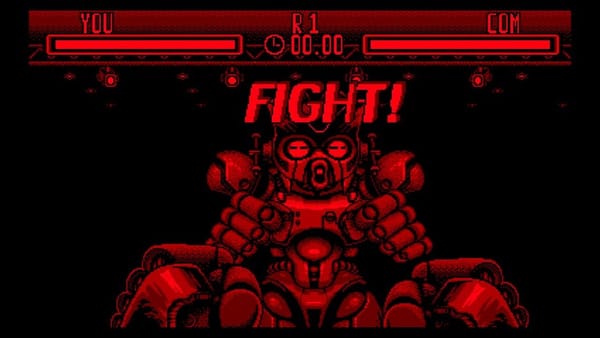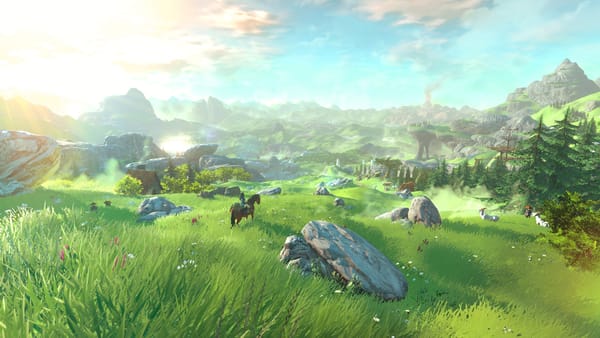#170: Games of the year 2022
It’s time!

Well hello! Hit Points’ 2022 wrap-up continues with what, for many, will be the main attraction. After spending far too many hours during my career cooped up in meeting rooms arguing over the precise ordering of an annual top ten, it’s been quite liberating to make these decisions on my own — and even more liberating not to have to come up with an actual top ten, because I haven’t played enough good games this year to fill one. Instead I have obsessed over a handful, and I shall simply write about those and be done with it.
These days I think of myself as a columnist first, a consultant second and a critic… like, tenth or something? Behind dad/husband/dog-alpha/cleaner/launderer/chauffeur and all that other stuff. But it’s been nice to slip back into my old ways and wax lyrical about the handful of games I’ve fallen in love with over the course of the year. Let’s go!
GAME OF THE YEAR 2022
Elden Ring
FromSoftware, PS5
Yes, I know, bit predictable. If it helps, I really didn’t like Elden Ring at first. Ever since its announcement I’d been unconvinced about how successfully the FromSoft template would transplant to a true open world. Those two components just seemed, conceptually, to be in conflict. I figured it would go one of two equally unsatisfying ways: either they’d use some sort of level scaling to let you go wherever you want, whenever you want, which wouldn’t feel like a From game at all; or the difficulty would be so punishing if you deviated from the critical path that it would only be an open world on paper. I dabbled a bit with the beta, died to just about everything I faced, and simply wasn’t convinced. What’s the point in an open world if you’re inching through it at a snail’s pace, finding death around every corner, spending hours or days retracing the same steps?
My real problem with it, it turns out, was one of mindset rather than concept. I have a pretty different sort of relationship with FromSoft’s games, I think. In my Edge days I reviewed Dark Souls II and III, Bloodborne and Sekiro. These games are hard enough in and of themselves; now try playing them with no online guides to follow, no communities to give advice, no co-op summoning and no idea of where you are supposed to go next. To review a FromSoft game is essentially to lock yourself in a pitch-black room for two weeks and hit your head against the walls over and over again, then emerge to proclaim it the best fortnight of your life and stick a 9 or 10 on it.
So this is how I approached Elden Ring at first: looking for high, sturdy walls at which to throw myself. I spent a solid day running between a bonfire and the first proper boss, Margit the Fell Omen. Then another day on Godfrey. Then Renalla. I got horrifically stuck on Starscourge Radahn, but just kept trying.
The game felt worryingly small at this point. A large world, sure, but one so full of roadblocks that the land around it just felt like set dressing. It might as well not have been there at all, because all I could see was whichever bonfire-to-boss corridor I was currently stuck in. I was reviewing it for Edge, and had only agreed to the gig because they promised me a decent amount of time with it; four weeks or so, as I recall. A week in, the online review embargo lifted and the 10s rained down like Radahn’s arrows. I was mystified.
Slowly, I realised my error. In previous FromSoft games, when you got stuck on a boss, you knew it had to be possible. The game was telling you that, yes, this is hard, but you can do it. You have to do it, actually, because this is the thing that stands between you and the rest of the game. But in Elden Ring, if a boss is too hard, the game is probably telling you to piss off. You are not ready, it whispers. Head out into the world. Strike out in random compass directions, grow stronger and come back. I finally got the message: stop playing it like you’re reviewing it, even though you are.
So I sacked off Radahn, and did something I’ve never done in a FromSoft game. I pottered. I mooched! I wandered, letting curiosity lead the way, either conquering whatever I came across or, more often, running from it with my tail between my legs. I realised the game’s walls were not compulsory, but invitations to ascents I could complete at my leisure. Over time I learned to identify the difference between a hard fight that was winnable and one I just wasn’t ready for yet; between the battle you charge back into and one from which, for now, you walk away. A game that had for the best part of 30 hours felt troublingly small began to grow rapidly.
And boy, how it grew. Elden Ring’s true masterstroke — the one thing that, as soon as you notice it, you are amazed no other game has done before because it is so brilliant, so simple, so obvious — is the way its map zooms out as you explore. All that fresh acreage unfurling as you go is not just a measure of your progress through this beguiling land, but also a classic Miyazaki tease. It keeps you forever guessing at just how much of it is left, at how much further the map intends to zoom out, and you will never know for sure until it is over. It is staggering to me that the quality never seems to dip, how every corner turned feels handmade, curated, crafted. It is a vast, freely explorable world that somehow has the pacing and precision of a ten-hour linear adventure. I still can’t get my head around how they did it.
The game is a blur to me now, a haze, my memories of it existing mostly in flashes of various bits of disjointed brilliance. This, too, sets it apart from the rest of the FromSoft oeuvre. At a dentist’s appointment a few years ago I distracted myself from a tooth extraction by mentally walking through Dark Souls. From Firelink I ventured up to the Gargoyles, back down to Quelaag, then up to the top of Sen’s Fortress and through Anor Londo. (Mercifully the dentist was finished before I got to the bit with the archers.) Dark Souls, or at least the linear first half of it, is seared into my brain because it is a succession of walls; I know the order of them and the quickest routes that link them, the way a London cabbie’s Knowledge breaks the city down into landmarks and the streets in between. I could probably walk you from the tutorial area to Margit’s door in Elden Ring, but that’s about it. I just remember going to a lot of places, each as sprawling yet intricate, beguiling yet foreboding, unforgettable yet somehow forgotten as the last, falling harder and harder in love all the while.
I haven’t been back to it since the day I completed it. Normally by the time you finish your first playthrough of a FromSoft game you are already thinking about your second one, maybe even a third — the loot you’ve picked up but cannot use hinting at the possibilities for new builds, setting the synapses firing. But my one playthrough of Elden Ring was somehow enough. When the credits rolled, I wasn’t straight back into the character creator to start a new run. I didn’t even touch NG+. Instead I just sat there, stunned and delighted and really quite sad that it was over, that I had finally run out of one of the best games I have ever played. There are some games you don’t want to replay, because you know it’ll never be as good as the first time, and the first time was pretty much perfect. I am quite happy leaving it at that.
HONOURABLE MENTIONS
Wordle
Josh Wardle, browser/iOS
It is not just that Wordle is a good game, though it absolutely is. It is an immaculate puzzle game, simple in concept yet often fiendishly difficult, a breezy bite-size brain-teaser that has become as vital to my morning routine as the pot of strong coffee and the brisk walk with the dog. But it is more than that. What amazes me most about it is how quickly it has woven itself into my daily life. It feels like it has always been there, and I suspect it will remain there forever.
Wordle is more than a game, really, already. It’s that rare breakout thing that everyone seems to cotton onto overnight: you know it’s not a normal game when your Mum is asking you if you play it, and she was on the case within days of me first hearing of it. It has quickly become a verb: I do not remember how quickly my wife and I stopped saying ‘have you done Wordle today?’ and replaced it with ‘have you wordled yet?’, but it did not take long. And it’s a heartwarming story, a hobbyist project knocked up for an audience of one going viral thanks to a simply genius share function, then getting bought for seven figures by the New York Times.
I’ve failed it a few times, forgot to do it occasionally when distracted by other things, and I am yet to solve it on my first go, though I have helped someone else do it. One day the solution was ‘PRICK’, and I used the in-app share function to tweet about it, saying: “I saw this and thought of you.” Edge’s features editor Alex Spencer later replied to say he’d seen the tweet and promptly nailed it on the first try. Lovely stuff, though Alex, if you’re reading this, please work on your self-esteem.
Still, I’m sure I’ll get it one day. I use the same starter (STARE, thank you for asking) every day, and there are only so many five-letter words in the dictionary. It is only a matter of time, and I am perfectly happy to wait. It is not often, when the end-of-year awards come round, that one imagines a featured game to have all that much of a shelf life. But I’ll be playing this one for decades, I reckon.
Vampire Survivors
Poncle, PC
Another heartwarming story: a web developer makes a hobbyist version of an overlooked mobile game, chucks a free demo on Itch and a cheap-as-chips early-access version on Steam, and within weeks has one of the year’s breakout hits on his hands. I didn’t play Magic Survivor, the Android game by which Vampire Survivors was inspired, and so to me (like most others) VS felt truly fresh. It is quite a hard game to describe; when a friend asked for recommendations for his newly purchased Steam Deck it took me a few goes before I landed on something that even came close to explaining its premise, much less its magic. (In case you’re wondering: ‘it’s like the Pacifism achievement in Geometry Wars, but you get to kill things.’ Not bad, I think, but barely scratching the surface of it.)
The weird thing about Vampire Survivors is that it puts me to sleep. You can keep your meditation, your melatonin, your lavender pillow spray and your sunset lamp; I have honestly properly dropped off on several occasions while thousands of pixellated undead were trying to eat me alive in Vampire Survivors. Sure, you can blame that on age to an extent, I suppose, if you’re mean. But this is a game built out of contradictions. It is all-out action, yet highly relaxing; a game in which you kill tens of thousands of monsters, without pressing a single button; one that tasks you with surviving for 30 minutes and then, when you do it, has the grim reaper rock up and kill you anyway. Most of all it is a game that, despite its vintage styling, feels utterly modern. It is the only thing I have played in 2022 that has felt truly new.
Sure, it wasn’t the first of its kind, as its developer would be the first to admit. But it is the proof of concept — the Minecraft to Magic Survivor’s Infinimer — and its influence has been significant, and fast as lightning. When the mobile version surprise-launched during The Game Awards the other week, I scurried off to download it. It was buried in its own search results on the App Store, beneath a dozen or so of the many fast-follow clones that have appeared in its wake. Sure, you can read that as a sorry indictment of the creative bankruptcy of the smartphone scene if you like, and yes, you’d probably have a point. Really though, it is testament to the influence, the simple genius, and the sheer soporific magic of Vampire Survivors’ design. Banger.
Ahh, there we go. I should point out here that I haven’t played Immortality yet because Sam Barlow’s games make me feel very uncomfortable in a voyeuristic sort of way, and I’ve just not been in the right headspace for that these past few months. Forgive me, Sam! It’s at the very top of the pile of shame, though, which I hope to put a decent dent in over Christmas. You can’t not play an Edge 10, eh. Rules is rules.
Anyway, I hope you enjoyed all that. Do let me know, if you have a moment. Paid subs, I’ll see you tomorrow, for the inaugural Hit Points Reader Awards. Free folks, if you’d like to join the fun, click the button below — failing that, I’ll see you all on Friday, for the final edition of the year. Catch you then!





